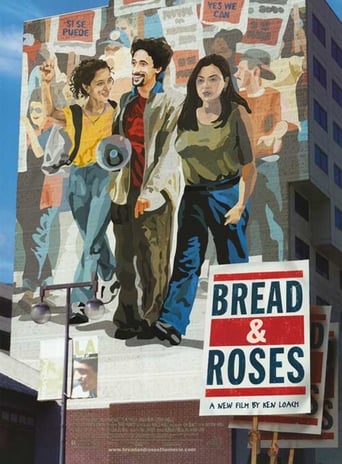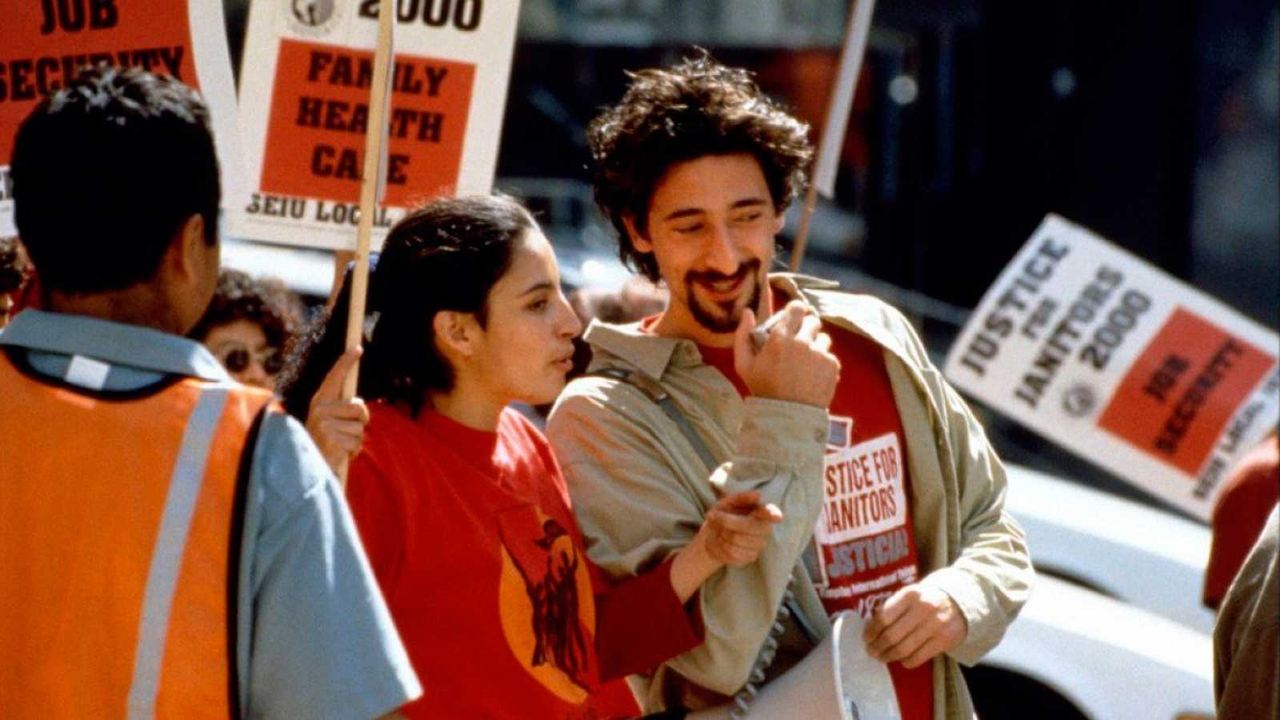tieman64
"As a white person I had been taught about racism as something which puts others at a disadvantage, but had been taught not to see one of its corollary aspects, white privilege, which puts me at an advantage. I was taught to see racism only in individual acts of meanness, not in invisible systems conferring dominance on my group." - Peggy McIntosh"Economics is haunted by more fallacies than any other study known to man." - Henry Hazlitt"Bread and Roses" was director Ken Loach's first feature to be set (and filmed?) in the United States. The film was funded by small European financiers and received limited distribution in the US. Though Loach waters down his narrative for Hollywood audiences – the film's fairly conventional, plot-wise – his customary mix of political sermonising and urgent neorealism (what he calls "socioeconomic realism", an offshoot of socialist realism) remains absolutely abhorrent to most moviegoers. For this, he remains marginalised. Its title alluding to a 1912 textile mill strikes in Massachusetts, "Bread and Roses" revolves around a workers' strike in a non-union office building in downtown Los Angeles, the home of Hollywood. Much of the film revolves around impoverished office workers and Latino immigrants, who struggle for decent wages, to keep their families together and to fight against their ethnic and professional "invisibility". Sounds familiar? Loach has been making such films for decades, but this is one of his best. He skirts around most "Coroporations vs Little Guys" clichés, and focuses instead on the ways in which underclasses prey upon themselves, and how such bickering serves only to bolster exploitation. Corporate executives and limousine liberals, who pick up humanitarian awards while relying on custodial firms who pay less than minimum wage, remain off camera, alluded to but never seen. Loach's cast is primarily composed of non-actors, but some famous faces turn up. Adrien Brody plays a young union organiser named Sham Shapiro, and exudes a nice mix of likability, scruffy dissidence and intolerable smugness, his character self-righteously mouthing union maxims from the safety of suburbia. He organises the workers, helps them unionize, but they take all the risks, and his sheltered, financially stable life-style is far removed from their squalor. Brody's the son of the great Sylvia Plachy, photographer, artist, left-winger and radical. Comedian George Lopez also turns up. He essentially plays a supervisor of janitors, a monstrous spawn of capitalism and Latino machismo who protects his position by ruthlessly enacting the will of the bosses, cultural and familial ties be damned. And then there's veteran actress Elpidia Carrillo, who plays a burnt-out Mexican woman who betrays the unions. A volcanic last act revelation, in which she spells out for her righteously indignant little sister why she did what she did, is particularly mind blowing. Here the actress summons a powerful blend of tear-inducing pain and fury. Her revelation hammers home the point of the film, the point of many of Loach's films, and a point which Bertolt Brecht famously laid out almost a century ago in "The Threepenny Opera": "First comes food, then comes morality". Brecht's statement encapsulates a range of human behaviours, primarily two which operate as a sort of double-helix or feedback loop; man ignores immorality because he fears of losing what he has, and man ignores morality when he has nothing. Somewhat unique for this "type" of film, Loach's immigrants are not portrayed as some ubiquitous, exotic mass, but full characters with diverging, very individual views, some indifferent, some self-centred, some politically informed (and indifferent or self-centred for diametrically opposed reasons) and some engaged in political activity back in Mexico. They are not naive pawns led by Brody, who in another director's hands may have developed into a white saviour. Brody's gang are real, savvy, and have their own deeply embedded (and often conflicting) modes of survival. For all its cathartic fury, for all its nods to 1920s Soviet Cinema, with its marching militants, placard pumping, Eisensteinian ideals and collective heroes, Loach's last act is ultimately pessimistic. Our heroes are shipped back to Mexico and we're suspicious of even what little has been won. Loach, like John Sayles, is too much of a small thinker to navigate his way out of the problems his films deal with. And while his brand of cinema is necessary, there is a feeling that, as Theodor Adorno once showed, though art represents a resistance to the violence of conformist thinking, non-conformity itself wasted away long ago, became insipid, became consumer goods. Art can no longer be a refuge for truth, Adorno believed, in the long term it will merely represent a flight into illusion, even if it does have a dialectic force. Still, Loach at least encourages some engagement with a prevalent form of cultural metapathy, which is not just traditional "apathy", but a pathological indifference, in which all manners of misconduct (from stolen elections to "benign" policies which actively court illegal immigrants) can happen without the batting of an eyelid.8.5/10 – Worth one viewing. Makes a good companion-piece to "Salt of the Earth" and "My Name is Joe".
CountZero313
Illegal Mexican immigrant Maya (Pilar Padilla) arrives at her big sister's house looking to work with her as an office cleaner. She dodges potential abduction and rape on her hazardous quest to make a better life for herself. However, union organiser Sam (Adrien Brody) convinces her that betterment lies not in slaving for below minimum wage, but in joining his Justice for Janitors campaign.Watching Bread and Roses I realised that, for many years, my wish to support Ken Loach and Paul Laverty has over-ruled my actual dislike for their films. Bread and Roses references an inspiring story, but the actual relaying of it cinematically by Loach, and in narrative terms by Laverty, is flat and under-realized. The rhythm of the scenes is stuttering, like poor improv or early rehearsals. Sam shows up at big sister Rosa's house, and immediately launches into a pro-union speech like he has known these people for a while. The cleaning company boss is a pantomime villain. There is some kind of spurious romance triangle that never really develops, and a few so-called comedy scenes to ease the intended sense of tragedy, except the whole thing is so uninvolving that it hardly matters.As much as Laverty cannot characterise beyond two-note archetypes, Loach appears unable to manage shot flow. The camera seems merely plonked down in front of the actors - there is not one frame where the composition seems planned, never mind memorable.Kes is a masterpiece. But since then, I have sat through Riff Raff, Land and Freedom, Sweet Sixteen, My Name is Joe, Carla's Song, Ae Fond Kiss... and come away underwhelmed each and every time. The themes are oh-so earnest, the politics very correct, the focus on the under-represented, marginalised and disenfranchised laudable in the extreme. It just never seems cinematic. Does Loach ask himself "Why is this topic better as a fiction feature than a documentary?" If he does, I cannot imagine what the answer is.My father was a car factory shop steward, so I grew up with these issues in my living room. I come from a Glasgow working-class background, so I am empathetic to many of Laverty's chosen arenas. But the bottom line is, I just don't find myself entertained or edified by any of these films. Watching Bread and Roses, I didn't laugh, and I didn't cry. And it was clearly going after both reactions.Loach does get some great performances at times (e.g. Peter Mullen in My Name is Joe), and here Pilar Padilla as the lead, and Elpidia Carrillo as her long-suffering elder sister Rosa, bring a touch of authentic rawness to the subject. But in a key revelatory scene between the two, the camera is placed at an in-between distance, the cutting arbitrary, and the words seem scripted rather than spontaneous.Loach and Laverty now have a substantial body of work to their collaboration. Quite simply, I do not understand why.
leonid-10
I'd like to start with a positive note: I liked the performance of Elpidia Carrillo.I did not care much for the rest of the movie.It has been shown, again and again, that trade unions are bad for the American economy. The UAW union has been "successfully" destroying the American automobile industry; the teachers' union has been no less successfully destroying the American schools; et cetera, et cetera. But these minor details shouldn't matter, should they, when we watch "Bread and Roses"? This movie, if you take it seriously, wants you to believe that without a union, the only way for a woman to get a job for herself or for her sister is to sleep with the boss; otherwise she can only support her family by becoming a prostitute.The cute female lead, an illegal Mexican immigrant, robs a gas station, but we are supposed to sympathize with her because this is "for a good cause".The male lead, a union organizer, steals the food from a table in a restaurant, and we are supposed to admire him for that and other examples of outrageous anti-social behavior.The demonstrators, when asked for their names by the police, give the names of Mexican revolutionary figures, and we are supposed to laugh at the stupidity of the American policemen.The illegals, oops, the undocumented workers, struggle to improve their lot in this country, instead of doing the same in their own country, or waiting in line to come here legally. We of course are expected to fully support them, to embrace them, to learn their language, to sing their songs. It shouldn't cross our mind that they have already broken the law of this country by crossing the border illegally and just for that alone should be treated as criminals.And that's both funny and outrageously shameful.
tvelasco-2
I just recently watched the latest attempt from Hollywood to ease their minds about Latino issues. "Walkout" is an HBO movie that takes a historic moment in the struggle for equality and makes an "after school" special out of it. On the other hand "Bread & Roses" delivers in every front, a good story with candid acting and a solid structure. The back drop is similar. Minorities confronted with discrimination and racism must come together to force change. A basic rule of good writing calls for a story of universal value and this one resonates beyond it's outline, because the story of the immigrant in this country is everybody's story. "Bread & Roses" doesn't preach and it doesn't dumb down the intricate subtext of the story, most of all it takes the characters seriously and never uses them as just background to carry on. HBO must remember that it takes more than a Latino surname in the credits to make a Latino story resonate. "Bread & Roses" relays on the elements that are true to good film making without having to label it. Always respect your story.


 AD
AD


